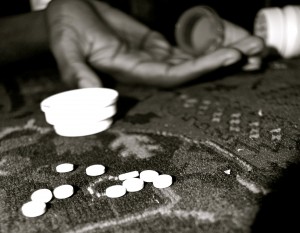by Meryem Grabski @MeryemGrabski
 Towards the end of last year headlines emerged about captagon, a psychoactive drug “used by the ‘Islamic State’ to create brainwashed, psychotic killing machines”, able to “stay awake days at a time“. The interest in captagon reached a peak when it was suggested that the terrorists responsible for the attacks in Paris last November may have been under the influence of the drug, a claim that has turned out to be most likely untrue. However, it is not surprising that the potential involvement of a drug in the activities of the “Islamic State” (IS) has been the subject of such media interest, ranging from headlines about “superhuman soldiers” and “jihad junkies”, to suggestions that captagon is one of the main reasons that the war in Syria is still ongoing. In my research, I spend most of my time trying to find methods that might improve treatments for drug dependence, so I had two immediate reactions to these headlines: curiosity about what this substance really was, and irritation at the superficial, irresponsible way the issue was covered. Motivated by this I would like to look at: a) what information on this drug is actually substantiated, and b) how the sensationalist coverage of drugs has serious negative consequences for people suffering from addictions.
Towards the end of last year headlines emerged about captagon, a psychoactive drug “used by the ‘Islamic State’ to create brainwashed, psychotic killing machines”, able to “stay awake days at a time“. The interest in captagon reached a peak when it was suggested that the terrorists responsible for the attacks in Paris last November may have been under the influence of the drug, a claim that has turned out to be most likely untrue. However, it is not surprising that the potential involvement of a drug in the activities of the “Islamic State” (IS) has been the subject of such media interest, ranging from headlines about “superhuman soldiers” and “jihad junkies”, to suggestions that captagon is one of the main reasons that the war in Syria is still ongoing. In my research, I spend most of my time trying to find methods that might improve treatments for drug dependence, so I had two immediate reactions to these headlines: curiosity about what this substance really was, and irritation at the superficial, irresponsible way the issue was covered. Motivated by this I would like to look at: a) what information on this drug is actually substantiated, and b) how the sensationalist coverage of drugs has serious negative consequences for people suffering from addictions.
 The drug the media are calling captagon has been associated with brand named “captagon”: the psychostimulant fenethylline. However, there is probably a substantial difference between the original formulation and the drug traded as captagon in the Middle East today. Fenethylline was developed in the 1960s and mainly used for the treatment of children suffering from attention deficit hyperactivity disorder (ADHD). In 1986 it was listed by the WHO for international scheduling under the Convention of Psychotropic Substances and banned by most countries. Illegal trade of counterfeit captagon rose afterwards in some Eastern European countries and the Middle East, in particular the Gulf States. However, analyses of pills to be sold as captagon that were seized in Saudia Arabia, Jordan and Serbia have indicated that the amount of genuine fenethylline has decreased over the years, with the most recent studies finding no evidence that fenethylline was present at all. The main active ingredients that were found included amphetamine and caffeine.
The drug the media are calling captagon has been associated with brand named “captagon”: the psychostimulant fenethylline. However, there is probably a substantial difference between the original formulation and the drug traded as captagon in the Middle East today. Fenethylline was developed in the 1960s and mainly used for the treatment of children suffering from attention deficit hyperactivity disorder (ADHD). In 1986 it was listed by the WHO for international scheduling under the Convention of Psychotropic Substances and banned by most countries. Illegal trade of counterfeit captagon rose afterwards in some Eastern European countries and the Middle East, in particular the Gulf States. However, analyses of pills to be sold as captagon that were seized in Saudia Arabia, Jordan and Serbia have indicated that the amount of genuine fenethylline has decreased over the years, with the most recent studies finding no evidence that fenethylline was present at all. The main active ingredients that were found included amphetamine and caffeine.
The source that most recent media articles on captagon have cited is the BBC Arabic documentary “Syria’s war drug”, which includes interviews with users from Lebanon and Kuwait, and alleged former Syrian fighters. It also touches on the captagon manufacturing and trading processes in Lebanon, as well as its potential connection to groups involved in the Syrian conflict. Importantly, the film makes no claims at any point that this drug is directly related to IS, a fact which has either been ignored or misrepresented in much of the subsequent media coverage.
Apart from the fact that the reporting on captagon has been superficial at best, there is also the issue that sensationalist headlines usually obscure the complexity that underlies any drug story. Oversimplification has been identified as a major problem when it comes to disseminating information on drugs to the public. The media plays a key role in shaping public opinion on drugs, which in turn influences public and criminal justice policy. Direct consequences include the increased use of a certain drug due to its omnipresence in the media, as observed during the discussion of the now illegal substance mephedrone, or the misplacement of governmental resources to overcome perceived, yet unconfirmed, drug threats, as was the case when headlines emerged in the USA linking the use of “bath salts” to extreme violence.
 But it is the more long-term, indirect consequences of a sensationalist media discourse that are probably the more harmful ones. The reinforcement of the notion that illegal drugs are one of the main causes and perpetuators of crime is one of them. The recent portrayal of captagon too, supports the idea that drugs are mostly consumed by criminals. The focus was not on how increased use of a drug might harm the civil population in Syria. Instead, news stories attempted to link the drug with IS, the most criminal, abhorrent organization involved in the conflict, despite no good evidence for such a connection. Readers are left with simply a vague association between illegal drugs and terrorism. The stigmatization of people addicted to drugs, increased unfounded public fear of drug-related crimes, and less room for discussions on how we can help prevent and cure addiction are just some of the consequences of inadequate media coverage.
But it is the more long-term, indirect consequences of a sensationalist media discourse that are probably the more harmful ones. The reinforcement of the notion that illegal drugs are one of the main causes and perpetuators of crime is one of them. The recent portrayal of captagon too, supports the idea that drugs are mostly consumed by criminals. The focus was not on how increased use of a drug might harm the civil population in Syria. Instead, news stories attempted to link the drug with IS, the most criminal, abhorrent organization involved in the conflict, despite no good evidence for such a connection. Readers are left with simply a vague association between illegal drugs and terrorism. The stigmatization of people addicted to drugs, increased unfounded public fear of drug-related crimes, and less room for discussions on how we can help prevent and cure addiction are just some of the consequences of inadequate media coverage.
Of course, it is not only sensationalist headlines that lead to these unhelpful consequences, and there are many ways of counteracting them. The provision of information, in as unbiased a way as possible, is one of them. This is where science, and scientists, can play an important role. As well as disseminating their research to the scientific community and publishing in scientific journals, scientists should consider it part of their job to inform and discuss their research publicly. Not only does it help to counter unfounded media stories and inform public opinion – the public engagement opportunities I have had during my PhD so far have been fun and inspiring.
